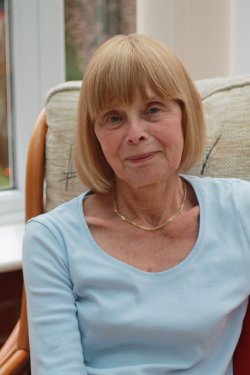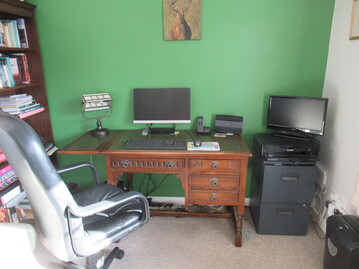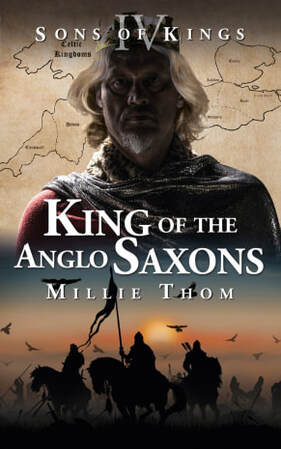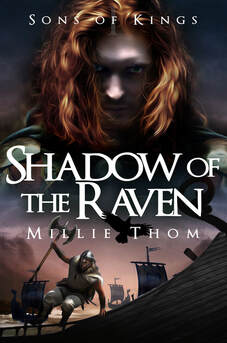Yes, like the rest of Western Europe, we get a heck of a lot of it, but we make the most of it and remember that without it the countryside wouldn’t be so green. So, we all long for the sunshine and then moan that it’s too hot when we get it. As for me, I love the sun (in small doses) but I also love a nice gentle rain. Both give me that feel good factor. Sailing will always get my vote in preference to flying, despite my huge phobia about sharks. I’ve never sailed on anything bigger than a ferry, but strolling on the decks watching the sea and seabirds is far better than being confined to a seat in an aeroplane. But, like everyone else, my family and I have flown many times for the speed in which it gets us to our destinations. "Sailing will always get my vote in preference to flying, As a writer of historical fiction, including four books about Alfred the Great, I’d like to go back to A.D. 871, the year in which Alfred defeated the Danes at the Battle of Ashdown and several months later was crowned king. Naturally, I’d need to be an invisible observer at the battle. It was a bloodthirsty affair to say the least, as were all his battles. What does a productive day of writing look like for you? Do you write on a schedule? Do you have a dedicated writing space or do you write on the go? Do you write in quick bursts or in grueling marathons? I have a big desk and a filing cabinet in our study where my research documents and other writing materials are kept. A desktop computer sits on the desk, although I rarely use it. I much prefer to write on my laptop, and that can be in any room in the house and more often than not in the afternoons and evenings. My mornings tend to be taken up by long walks and doing any shopping or housework that needs to be done - the usual, boring stuff. The length of time I spend on my writing varies. Sometimes it can be for several hours at a time, at other times just a short burst. When I have long blog posts to write, I confess that time for my novel writing suffers. Millie's Writing Desk On your website, you recall growing up in a working-class family in Southport, UK. How did this childhood experience influence you as a writer and does your family background play into your stories? I had an extremely happy childhood and my parents ensured their three children had plenty of books to read, mostly through the local library. As yet, my family background hasn’t influenced the content of my novels, which are set in the mid-ninth century. However, I like to explore human emotions and behaviour and there were some colourful characters in my family - Irish and Welsh amongst them - who have undoubtedly played a part in creating some of the characters in the flash fiction pieces I’ve included in A Dash of Flash and those I’m still writing on my blog. "I like to explore human emotions and behaviour and there were some colourful characters in my family - Irish and Welsh amongst them - who have undoubtedly played a part in creating some of the characters..." I also feel I can sympathise with the struggles that poverty can cause. Fortunately for my family, my dad was never out of work so we had decent food and clothing and a roof over our heads. Many people didn’t then, and many don’t today. I have considered writing my memoir, starting with my earliest memories at the end of the 1940s. Either a memoir, or a novel set mostly in the 50s, would involve many of those ‘colourful characters’ and of course, a look at post-war Britain. You are the author of the Son of Kings series and recently released the fourth book titled King of the Anglo Saxons. First off, congratulations! What inspired this series and how did your writing process evolve over the course of writing it?
By 2004 I’d managed to write the first half of Book 1, Shadow of the Raven, when I noticed Bernard Cornwell’s first book featuring King Alfred in a book store in Australia, where we were on holiday. I admit to being a little gutted to see a novel about Alfred since, as far as I knew, no one else had written one. But after 2004 my writing went ‘on hold’ anyway due to my teaching commitments. Even after I’d retired in 2010, the story was ignored for another two years as we spent long holidays in places we’d always wanted to see. In 2012 I decided to persevere with the book, eventually finished it, found a good editor and self-published it on Amazon in 2014. Since then, writing has become the focus of my life and I couldn’t imagine a day of not doing any. I’ve learned a lot about writing techniques, style and characterisation while writing my books and feel sure the learning process will continue. "I noticed Bernard Cornwell’s first book featuring King Alfred Indie publishing is hard work and it can take a long time to build up reviews. My books are on Kindle Unlimited, which allows authors to have five free days every three months. I’m not particularly convinced it’s worth giving my books away for free, especially as being with KU demands exclusivity, which means that my books can’t be sold on any other platform. I’m still debating whether or not to take them off KU. Being self published also means that a lot of time must be spent on social media sites in order to promote the books. But I’m told that traditional publishing demands as much work in that respect. There are thousands of self-published books for sale and becoming successful and selling huge numbers of books doesn’t happen to many authors. I’m struggling along like the majority of us. "Indie publishing is hard work and it can take a long time to build up reviews... Being self published also means that a lot of time must be spent on social media sites in order to The particular time period in Viking history that you write about is enjoying the public spotlight through series such as History Channel’s Vikings and the adaptation of Bernard Cornwell’s The Last Kingdom on Netflix. Are there any misconceptions that viewers might pick up from these film adaptations or are there any important characters that you feel get left out of the picture?
Viking history is full of brilliant female characters but they are too often overshadowed by the predominantly male narratives of the Norse sagas. As a woman writing fiction during this time period, how did you navigate this and in what ways were you able to explore the experiences of women during this historical period? I have to ensure that the women I write about behave, speak and dress in a way appropriate to the 9th century. I can only hope that my long hours of research, and visits to historical sites in various places in Europe, have paid off in that respect. I have some very ‘strong’ female characters throughout the four books, among both the Anglo-Saxon and Danish women. I’ve thrown them into a number of difficult, sometimes heart-rending, situations in order to show how they dealt with them. But at the end of the day, it was a male-ordered/patriarchal society and few women, other than those of noble birth, could aspire to more than menial roles in life. Perhaps the Norse shield maidens are an exception here - although I don’t have any in my series. "I have to ensure that the women I write about behave, speak and dress in a way appropriate to the 9th century. I can only hope that my long hours of research, and visits to historical sites in various places in Europe, have paid off in that respect." Can you give us any hints or sneak-peeks regarding your next big project? I’m currently researching my next novel and hope to start writing very soon. It will be a ‘one-off’ this time and set in early 17th century England. In fact, this story takes place in and around the village we moved to after leaving Wantage, so I’ve known much of its history since the late 1970s. My novel will focus on one particular historical event, and although most of the characters I intend to include actually lived, little regarding either their looks or their personalities is recorded so they will be largely of my creation.
1 Comment
|
AuthorJoshua Gillingham is an author, editor, and game designer from Vancouver Island, Canada. Archives
April 2022
Categories
All
|





 RSS Feed
RSS Feed
